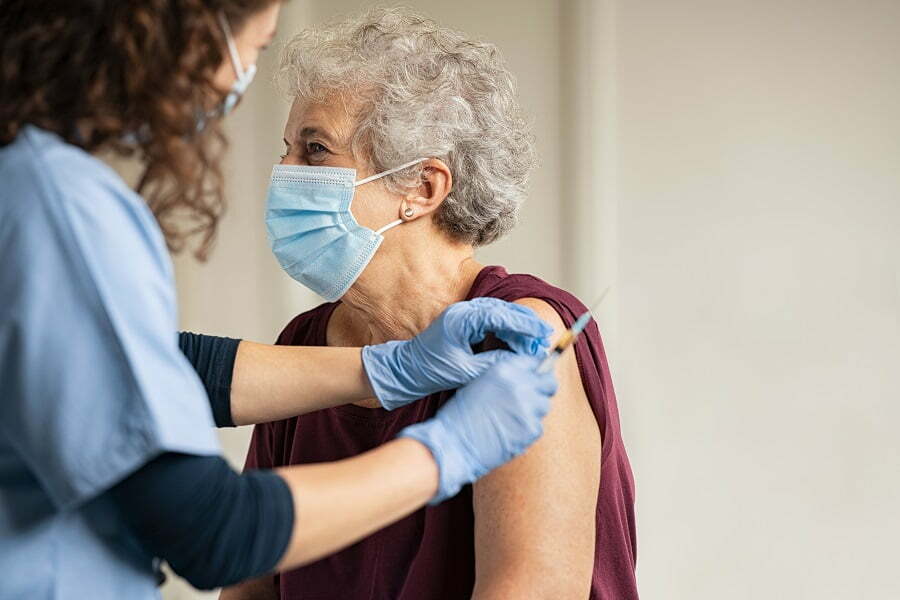
Importance of Vaccinations for Older Adults
Age affects our ability to fight off infection. Our immune response slows down and becomes weaker, leaving us more susceptible to diseases that can have an impact on our continuing health and well-being.
The term for this reduced immune response is “immunosenescence,” and there’s evidence to suggest it’s responsible for the reduced efficacy of vaccines for older adults, and why they’re more at risk from the flu, pneumonia and shingles than a younger person. For this reason, when you got a flu shot in the past, you may have still ended up catching the flu. Nowadays, new versions of the vaccine are designed to produce a more robust immune response in older adults. Vaccines remain among the most important preventive measures we can take to safeguard our health.
Lest We Forget
Polio, mumps, measles, chickenpox, and whooping cough routinely harmed or killed millions of infants, children and adults in the U.S. Nowadays, vaccines have greatly reduced or eliminated these and other infectious diseases. However, the viruses and bacteria that cause these diseases are still around. As an example, nearly 56,000 people die in the U.S. every year from acute respiratory infections, including influenza and pneumonia. These vaccine-preventable diseases are the most common causes of infection-related hospitalization and death in people 65 years old or older.
Right now, the COVID-19 virus is top of mind. And like many seniors, you may be awaiting a full rollout of coronavirus vaccines that offer potential relief from the threat of severe illness that COVID-19 causes. This is not the time to succumb to another kind of infection (such as an upper respiratory tract infection) and land yourself in hospital. It’s more important than ever to increase your immunity, and part of this is to protect yourself with a regular schedule of vaccinations for older adults.
Top 5 Vaccinations for Adults
It’s important for older adults to keep vaccinations up to date, because immunity from childhood shots can wear off. You’re also at risk of different diseases as you age.
Here are five vaccines that Medicare will usually pay for. Consult your doctor before getting them and discuss any other vaccinations you need. Guidelines by the CDC (Centers for Disease Control and Prevention) cover other common vaccines, but the following are the most commonly considered:
Flu Shot
According to the National Council on Aging, cooler temperatures weaken our immune system and increase the risk of illness and infection. It’s wise to get the influenza vaccine in the fall or early winter, before the flu season kicks in — ideally before the end of October. It takes about two weeks for the vaccine to take effect. Flu viruses mutate rapidly, and the flu shot can’t protect you from every strain out there. But research shows that being vaccinated against certain strains reduces your risk of serious illness. Ask for the senior-friendly high-dose versions if available.
Pneumonia Vaccine
Pneumonia causes severe infections in the bloodstream and organs. It kills one in 20 older adults who get it. If you’re over 65, talk to your doctor about getting a pneumococcal vaccination that will protect against infections such as pneumonia, meningitis and bacteremia. This vaccine is typically two shots, given about a year apart.
Shingles Vaccine
The shingles vaccine is given in two doses, two to six months apart. It’s highly effective at preventing shingles; a painful blistering rash, and postherpetic neuralgia, a complication causing excruciating pain that can last for years. Because demand for this vaccine is high, you may need to talk to your doctor about getting on a waiting list.
Tdap Vaccine
If you’ve never been vaccinated for whooping cough, a single dose will offer lasting protection against this serious illness, which causes violent, uncontrollable coughing. If you were vaccinated against whooping cough as a child, know that the immunity wanes as you age. A single dose of Tdap A booster will increase your immunity, protect you from tetanus and diphtheria, and keep you from spreading the illness to highly vulnerable babies and young children.
Hepatitis B
This contagious virus infects the liver and can cause liver damage or death. Seniors who contract Hepatitis B may think they have the flu or show no symptoms at all. Those with end-stage renal disease, diabetes or other conditions that lower their resistance are particularly at risk. It’s important to be vaccinated against Hep B as there’s no specific treatment for the symptoms.
How Do Vaccines Work?
Vaccines help stimulate the body’s immunity by imitating a virus. This mimicry triggers the production of antibodies that the body designs to fight that particular virus. Sometimes after getting a vaccine, the imitation infection can cause minor symptoms such as a fever. After these subside, the body continues to produce antibodies to fight that disease in the future.
For some types of vaccines, full protection doesn’t happen with a single dose. More than one dose is needed to build complete immunity in the body. Immunity usually wears off, requiring a booster shot to restore an effective level. Viruses can also mutate into different strains — a good example is the influenza virus. Every year, flu vaccines are developed to protect against the most common strains identified in our population.
Why Not Get sick, and “Get it Over With”?
Some people deliberately expose themselves to infections such as measles or chickenpox as a way of achieving immunity. For less severe diseases, this approach might be reasonable, but it’s not better than the immunity provided by vaccines. And even getting the disease in the first place can lead to severe complications that are life-threatening. This is certainly true for COVID-19. There’s a much higher risk of severe disease and death, especially for vulnerable groups like the elderly and those with weakened immune systems or other underlying health conditions.
Recently at The Buckingham, we administered both doses of COVID-19 vaccine to the first group of residents and team members in our community. There have been no significant side effects, and the vaccination program will continue until everyone who wishes to be vaccinated has received their dose. We’re committed to keeping our residents and team members safe, and strongly encourage you to follow mitigation efforts that will protect you and your loved ones. Wear a mask around others. Practice social distancing. Wash your hands often. And get vaccinated as soon as you can. Here’s the latest on how our community is handling the coronavirus.

